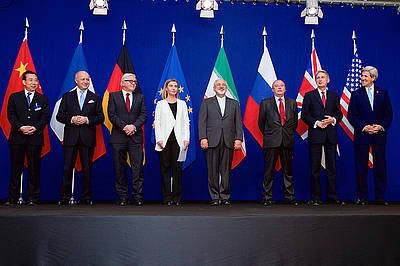“The framework for an Iran nuclear deal that negotiators reached on 2 April is a win for all involved, not just for the 8 parties involved, but for the region and the world as a whole,” says Mark Fitzpatrick, director of the NonProliferation & Disarmament Programme of the International Institute for Strategic Studies, a Carnegie Corporation grantee. While U.S. commentators haven’t come to a consensus on the nuclear deal with Tehran, reports from the nonproliferation organizations supported by the Corporation see the agreement as an essential step toward the ultimate goal of peace.
Why the optimism? “Perhaps the most crucial aspect lies in the International Atomic Energy Agency’s (IAEA) access to Iranian facilities,” writes Ariane Tabatabai in the Bulletin of the Atomic Scientists. “In the framework deal, Tehran has said it will once again voluntarily implement the Additional Protocol to its existing IAEA safeguards agreement, granting the nuclear watchdog more inspections authority. …This means that IAEA inspectors will be able to regularly monitor Iranian facilities and can conduct unannounced inspections as well.” Tabatabai is a visiting assistant professor in the Security Studies Program at the Georgetown University School of Foreign Service, and an associate in the Belfer Center's International Security Program and Project on Managing the Atom at Harvard University.
Read more expert analysis of the framework and its potential implications at the following grantee websites:
The International Institute for Strategic Studies:
Mark Fitzpatrick: Iran nuclear framework is a win for all sides
ISPI: In impending Iran nuclear deal, verification remains key
Bulletin of the Atomic Scientists:
Why the Iran framework is extraordinary
Why the framework nuclear agreement with Iran is good for both sides
The experts on the Iranian framework agreement
The Carnegie Endowment for International Peace
The Iran Deal: In-Depth Analysis of the Nuclear Negotiations with Tehran

State Department photos show (above) Secretary Kerry conferring with Iranian Foreign Minister Zarifat and (above) leaders from P5+1 nations following the negotiations in Lausanne, Switzerland on April 2, 2015 (l. to r.): Head of Mission of People's Republic of China to the European Union Hailong Wu, French Foreign Minister Laurent Fabius, German Foreign Minister Frank-Walter Steinmeier, European Union High Representative for Foreign Affairs and Security Policy Federica Mogherini, Iranian Foreign Minister Javad Zarifat, an unidentified Russian official, British Foreign Secretary Philip Hammond, and U.S. Secretary of State John Kerry.
- Press Releases


